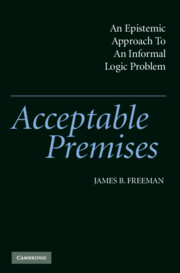Book contents
- Frontmatter
- Contents
- Preface
- Acknowledgments
- PART 1 ACCEPTABILITY: DIALECTICAL AND EPISTEMOLOGICAL COSIDERATIONS
- 1 Why Do We Need a Theory of Acceptability?
- 2 Acceptability and Presumption
- 3 Factors Determining Presumption: Basic Considerations
- 4 Epistemological Considerations: Acceptability, Deontology, Internalism, Justification
- PART 2 STATEMENTS, BELIEF-GENERATING MECHANISMS, AND PRESUMPTIVE RELIABILITY
- PART 3 PRACTICE AND PERSPECTIVE
- Notes
- References
- Index
3 - Factors Determining Presumption: Basic Considerations
Published online by Cambridge University Press: 02 December 2009
- Frontmatter
- Contents
- Preface
- Acknowledgments
- PART 1 ACCEPTABILITY: DIALECTICAL AND EPISTEMOLOGICAL COSIDERATIONS
- 1 Why Do We Need a Theory of Acceptability?
- 2 Acceptability and Presumption
- 3 Factors Determining Presumption: Basic Considerations
- 4 Epistemological Considerations: Acceptability, Deontology, Internalism, Justification
- PART 2 STATEMENTS, BELIEF-GENERATING MECHANISMS, AND PRESUMPTIVE RELIABILITY
- PART 3 PRACTICE AND PERSPECTIVE
- Notes
- References
- Index
Summary
We have given a definition of challenger presumption and indicated how challenger presumption may serve as a criterion of acceptability. As we noted at the end of the last chapter, if this is to advance our ability to determine when a statement is acceptable, we must be able to determine under what circumstances there is a presumption for a statement from a challenger's point of view. As Rescher points out in (1988), “The rational legitimation of a presumptively justified belief lies in the fact that some ‘suitably favorable indication’ speaks on its behalf, and no already justified counter-indication speaks against it” (1988, p. 50). Our task now is to identify these suitably favorable indicators. Our first step will be to look at principles of presumption that have actually been advanced and accepted. We have already noted two, a presumption in favor of the senses and in favor of memory.
Before proceeding to our basic survey of the principles of presumption, we must develop a point implicit in the preceding paragraph. Rescher speaks of the rational legitimation of a presumptively justified belief. This suggests a distinction between presumptively justified beliefs, and establishing that there is a presumption for such beliefs. If there is a presumption for a belief for a particular person qua challenger, need she be aware of that presumption?
- Type
- Chapter
- Information
- Acceptable PremisesAn Epistemic Approach to an Informal Logic Problem, pp. 38 - 72Publisher: Cambridge University PressPrint publication year: 2004



